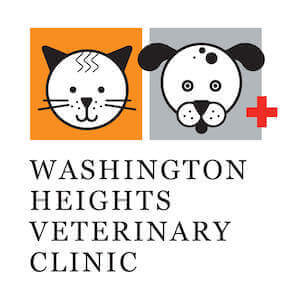Washington Heights Veterinary Clinic is a full service general medicine and surgery practice. Our team of seven veterinarians is backed by a highly skilled and compassionate staff of certified veterinary technicians and veterinary assistants. As your pet's primary care provider, we are dedicated to every part of your pet's health. This nose-to-toes approach means we are also your pet's dentist.
Hi, I'm Stacy O'Malley, one of the doctors here at Washington Heights Veterinary Clinic. Today I'd like to share with you some information about maintaining your pet's dental health, everything from what you can do at home to knowing when it's appropriate to schedule a professional dental cleaning.
I often have clients tell me their pet's teeth get cleaned at the groomer. Likely what's taking place is that the teeth are being brushed. This is great but brushing the teeth once a month is not going to prevent tooth and gum disease. Brushing needs to happen daily to a minimum of three times a week to keep plaque from turning to tartar and keep the gums healthy.
Often, during the oral exam, we will determine a home care regimen is all that's needed and we can show you how to start a daily routine of brushing your pet's teeth. This is common with our younger patients or ones that have had dental cleanings performed regularly. However, it may be determined that a professional dental cleaning is the most appropriate step to improve your pet's oral health.
With our patients, a complete and professional dental cleaning like the one you get at your dentist requires anesthesia. That's probably the biggest difference between your visits to your dentist and when your pets come to see us. That's also probably one of the biggest concerns our clients have when they're considering scheduling a dental cleaning. That's understandable.
Anesthesia always carries inherent risk for any patient and any procedure, that's why you want to make sure your veterinary team is taking all the measures to have a safe outcome, using the safest medications available and doing all the necessary pre-anesthetic testing, and supporting, and monitoring your patient while they're under anesthesia.
I also get asked if giving treats, chews, bones or just feeding kibble is enough to keep a pet's teeth healthy. The answer is not quite. At least for the majority of dogs, crunchy to treats and chews that are approved by the Veterinary Oral Health Council can be a great addition to oral care that cannot replace brushing in terms of efficacy.
Imagine your own teeth and gums if you were given an apple to eat each day but never brushed. When your pet arrives the morning of the dental cleaning they will be by the surgical technician. This person will be your pet's special buddy throughout the day. In fact, your pet has a team of three dedicated individuals, veterinarian, the technician, and the assistant, all committed to your pet's care and comfort.
A pre-anesthetic exam will be performed by the veterinarian and any necessary testing will be completed to make sure there are no obstacles to the day's plan. Your cat will receive a medication to help them relax and reduce the minor discomfort associated with the placement of an intravenous catheter. They will be placed under anesthesia with a second medication and a breathing tube will be placed. This tube will supply your pet with oxygen and the anesthetic gas needed to keep them sleeping peacefully.
This also gives our team control of your pet's airway should the need arise for us to assist in breathing. Though most patients breathe by themselves while anesthetized, the teeth will be cleaned using hand instruments and motorized ultrasonic instruments. The cleaning is followed by polishing and a fluoride treatment. Each tooth and the surrounding soft tissue is examined by the veterinarian.
Dental radiographs of the entire dental arcade are obtained and closely reviewed. This lets us know that the crowns are healthy above the gum line and the tooth roots are healthy below the gum line. If no problems are discovered, your pet is recovered from anesthesia all the while being closely monitored by their personal team.
If we do discover problems that go beyond the scope of our dental practice, we can arrange for your pet to see a specialized veterinary dentist right here in Houston. February is National Pet Dental Health Month and we are excited to participate by offering dental healthcare services at a reduced rate, but try to make every day dental health day for your pet, we're here to help.

